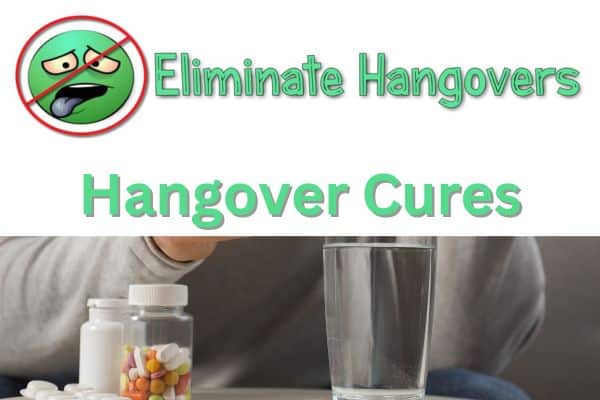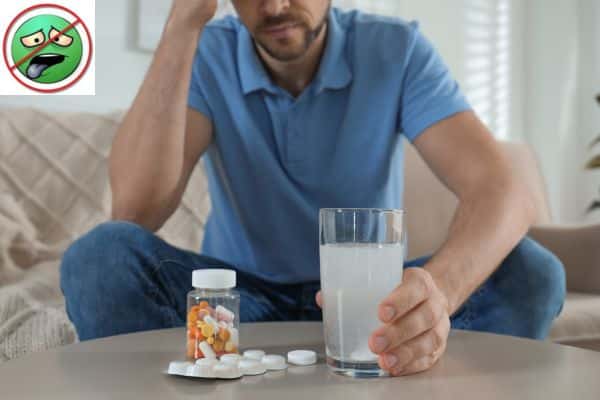Hangover Cure: Discover the Best Ways to Cure Your Hangover!
Understanding Hangovers: The Science Behind the Pain
The Science Behind Hangovers - Unveiling the Secrets As seasoned hangover prevention and recovery experts, we understand the intricate science behind those dreaded morning-after woes. A hangover is far from a mere headache; it's a multifaceted physiological response triggered by excessive alcohol consumption. Alcohol plays a pivotal role in the onset of hangovers. When you indulge in alcoholic beverages, your body metabolizes ethanol, a compound found in alcohol. This metabolic process generates acetaldehyde, an insidious toxin that can wreak havoc on various organs within your system, causing inflammation and damage. Dehydration also contributes significantly to the symptoms experienced during a hangover. Alcohol acts as a diuretic, stimulating urine production and resulting in fluid loss from your body. This dehydration manifests through throbbing headaches, fatigue, and parched mouth - all too familiar hallmarks of hangovers. Hangovers take their toll on both mind and body alike. Physically speaking, you may encounter bouts of nausea, vomiting episodes, muscle soreness or stiffness, along with heightened sensitivity to light and sound while experiencing an accelerated heart rate. Mentally speaking, changes in brain chemistry induced by alcohol consumption can make you irritable or anxious. Unraveling these underlying mechanisms within our bodies when faced with a hangover situation helps us devise effective strategies for prevention and treatment. By addressing the root causes - namely excessive alcohol intake coupled with dehydration - we can mitigate their impact on our overall well-being. Stay tuned for further insights into common symptoms associated with hangovers!
What is The Cure For A Hangover?
While there is no guaranteed cure for a hangover, there are steps you can take to alleviate symptoms. Stay hydrated, eat a balanced meal, and get plenty of rest. Avoid caffeine and alcohol, as they can worsen dehydration. If symptoms persist or worsen, seek medical attention.

Bytox Recovery Patch Review
Bytox Recovery Patch: The Ultimate Hangover Remedy Review See reviews on Amazon Bytox Recovery Patch Overview The Bytox Recovery Patch is a revolutionary …
Read Our Review!Common Hangover Symptoms: More Than Just a Headache
Unlocking the Mystery of Hangovers: Expert Insights into Banishing the Morning-After Misery At eliminatehangovers.com, we pride ourselves on our in-depth knowledge and expertise in hangover prevention and recovery. This section will delve deep into the science behind those dreaded morning-after symptoms, equipping you with valuable insights to conquer your next hangover.
- The Power of Alcohol and Dehydration When alcohol enters your system, a complex series of processes begins. One byproduct of this breakdown is acetaldehyde - a toxic compound notorious for causing inflammation and cellular damage. Moreover, alcohol acts as a diuretic, leading to increased urine production and dehydration.
- Impact on Mind and Body Hangovers can wreak havoc on your physical and mental well-being. Prepare yourself for common symptoms such as pounding headaches, nausea that won't quit, overwhelming fatigue, dizziness that leaves you disoriented like never before, sensitivity to light and sound that feels unbearable at times...the list goes on! You may also experience muscle aches that make every movement painful or find yourself irritable beyond belief while struggling to concentrate or remember even the simplest things clearly.
- Decoding Hangover Symptoms While there's still much left to uncover about hangovers' intricate workings within our bodies (a topic we're constantly exploring at eliminatehangovers.com), several factors contribute significantly: - Acetaldehyde buildup: As mentioned earlier, acetaldehyde plays an undeniable role in triggering inflammation - the root cause behind many hangover symptoms. - Electrolyte imbalances: Alcohol consumption disrupts electrolyte levels throughout your body, throwing various bodily functions off balance. - Immune system response: Your immune system may spring into action due to alcohol's impact on your body, resulting in widespread inflammation. - Sleep disturbances: Alcohol interferes with sleep patterns, leading to poor sleep or even insomnia, leaving you feeling groggy and far from refreshed during a hangover.
- The Long-Term Toll Repeated heavy drinking episodes followed by brutal hangovers can take a toll on your long-term health. Chronic alcohol use increases the risk of liver diseases like cirrhosis or fatty liver disease while gradually impacting brain function. By gaining an expert understanding of hangovers' underlying causes and effects, you'll be armed with the knowledge needed to prevent and alleviate their symptoms proactively. Hangovers are not mere inconveniences; they have profound implications for your overall well-being. Stay tuned as we unveil effective strategies to ward off those dreaded morning-after blues in our upcoming section.
Preventing Hangovers: An Ounce of Prevention is Worth a Pound of Cure
Preventing Hangovers: The Expert's Guide to a Hangover-Free Experience As an expert in the field, I can assure you that preventing hangovers is the ultimate goal. While countless remedies and cures exist, nothing beats avoiding a hangover altogether. Allow me to share some essential tips for preventing those dreaded morning-after symptoms:
- Stay Hydrated: Dehydration is one of the main culprits behind hangovers. Alcohol acts as a diuretic, causing your body to lose fluids rapidly. To combat this, hydrate yourself by drinking plenty of water before, during, and after consuming alcohol.
- Eat Before Drinking: Fueling up with a meal before indulging in alcoholic beverages can work wonders in slowing down the absorption rate of alcohol into your bloodstream. This gives your body ample time to metabolize the alcohol and minimizes its impact on your system.
- Pace Yourself: Moderation is essential for responsible drinking and avoiding hangovers. Set limits for yourself and stick to them throughout the night. Remember that excessive consumption will only increase your chances of experiencing severe symptoms the next day.
- Know Your Limits: It's crucial to understand that everyone's tolerance for alcohol varies based on factors such as weight, metabolism, and overall health condition. Knowing how much you can handle without crossing dangerous territory or waking up with regretful consequences is vital.
- Listen To Your Body: Pay close attention to how you feel while consuming alcohol; if you start feeling lightheaded or nauseous, take it as a sign that you've had enough or need a break from drinking altogether. By consistently following these preventive measures endorsed by experts like myself, your risk of experiencing debilitating hangover symptoms will significantly reduce. Remember that responsible drinking helps prevent hangovers and promotes better overall health. Now, let's dive into the world of common hangover remedies!
Hangover Remedies: From Old Wives' Tales to Scientific Solutions
The Ultimate Guide to Curing Hangovers: Expert-Tested Remedies and Science-Backed Solutions When it comes to curing hangovers, there are countless ways out there claiming to be the best cure. From old wives' tales passed down through generations to scientifically proven solutions, everyone seems to have their go-to remedy. But which ones work? Let's dive into the world of hangover cures and separate fact from fiction.
- Hydration is Key: Staying hydrated is one of the most crucial steps in dealing with a hangover. Alcohol acts as a diuretic, causing increased urine production and dehydration. Replenishing your body with water or electrolyte-rich drinks like sports drinks can help alleviate symptoms such as headaches and fatigue.
- Nourish Your Body: Proper nutrition plays a vital role in recovering from a hangover. Alcohol depletes essential vitamins and minerals in your system, so replenishing them through food can aid recovery. Opt for nutrient-dense meals that include fruits, vegetables, lean proteins, and whole grains.
- Rest Up: Resting is often underestimated but is integral to hangover recovery. After a night of drinking, your body needs time to recharge and repair itself while you sleep soundly. Make sure you prioritize getting plenty of restful sleep following a night out.
- Over-the-counter remedies: Several over-the-counter medications are designed explicitly for relieving hangover symptoms such as headaches or upset stomachs. These products typically contain ingredients like aspirin or ibuprofen for pain relief or antacids for digestive issues.
- Natural Hangover Cures: While scientific evidence may be limited on natural remedies for hangovers, some people find them incredibly helpful: - Ginger: Renowned for its anti-inflammatory properties, ginger has been traditionally used to soothe nausea. - Peppermint: This herb has calming effects on the stomach and can help alleviate digestive discomfort. - Honey: Adding honey to warm water or tea may provide a soothing effect on the body and help replenish energy levels. - Coconut Water: Packed with electrolytes, coconut water can aid in rehydration and replace lost minerals. - B-vitamins: Taking a B-complex supplement before or after drinking alcohol may support your body's natural detoxification processes. It's important to note that while experts have tested these remedies, their effectiveness may vary from person to person. It's always best to listen to your body and try different approaches until you find what works.
- Scientific Research: In recent years, there has been an influx of scientific research dedicated to finding effective hangover cures. Some studies have explored the potential benefits of dihydromyricetin (DHM) found in herbal extracts such as Hovenia dulcis. However, further research is still needed to determine their effectiveness conclusively. Remember, no miracle cure will instantly banish a hangover overnight. Recovery takes time, patience, and self-care. By following these expert tips and experimenting with different methods, you'll be well-equipped to conquer those dreaded hangovers.
When to Seek Medical Help: Hangovers and Alcohol Poisoning
When to Seek Medical Help: Hangovers and Alcohol Poisoning As experts in the field, we understand that sometimes a hangover can feel like more than just a simple case of overindulgence. It's crucial to distinguish between a hangover and alcohol poisoning because knowing when to seek medical help is paramount.
- Understanding the Difference: - A hangover occurs as a result of excessive alcohol consumption and typically manifests with symptoms such as headache, nausea, fatigue, and sensitivity to light or sound. - On the other hand, alcohol poisoning is a severe condition that arises from an overdose of alcohol in the body. If left untreated, it can be life-threatening.
- Signs of Alcohol Poisoning: While differentiating between a severe hangover and alcohol poisoning may pose challenges, certain signs indicate immediate medical attention is necessary: - Confusion or disorientation - Repeated or uncontrollable vomiting - Slow breathing (less than eight breaths per minute) or irregular breathing patterns - Pale or bluish skin color - Seizures or loss of consciousness
Steps to Take if You Suspect Alcohol Poisoning: If you suspect someone has alcohol poisoning, swift action is essential for their safety:
- Immediately call emergency services.
- Stay by their side until help arrives.
- Do not leave them alone, even if they initially appear fine.
- Encourage them to stay awake and sit up if possible.
- Refrain from inducing vomiting unless instructed by medical professionals. Remember that your well-being should always take precedence when dealing with the potential risks of excessive drinking.
If you're uncertain whether your symptoms stem from a severe hangover or something more serious like alcohol poisoning, do not hesitate to seek medical assistance. At eliminatehangovers.com, we prioritize your health and advocate for responsible drinking practices. If you or someone you know is struggling with alcohol use, seeking help from healthcare professionals or support groups specializing in addiction recovery is crucial. In the next section, we will emphasize the importance of prevention and responsible drinking as the most effective cures for hangovers. Stay tuned!
The Bottom Line: Responsible Drinking is the Best Hangover Cure
When to Seek Medical Help: Hangovers and Alcohol Poisoning As experts in the field, we understand that a hangover can sometimes be more than just a morning-after inconvenience. It's crucial to distinguish between a typical hangover and alcohol poisoning, as seeking medical help is essential in certain situations.
1. Understanding the Difference: - A hangover is the result of excessive alcohol consumption and often includes symptoms such as headache, nausea, fatigue, and sensitivity to light or sound. - On the other hand, alcohol poisoning is a serious condition that occurs when there is an overdose of alcohol in the body. If left untreated, it can be life-threatening.
2. Signs of Alcohol Poisoning: While distinguishing between a severe hangover and alcohol poisoning may be challenging, here are some signs that indicate immediate medical attention may be necessary: - Confusion or disorientation - Repeated or uncontrollable vomiting - Slow or irregular breathing - Pale or bluish skin tone - Seizures
3. Steps to Take if You Suspect Alcohol Poisoning: If you suspect someone has alcohol poisoning, it's crucial to act swiftly for their safety:
- Call emergency services immediately.
- Stay with them until help arrives. Do not leave them alone, even if they appear fine initially.
- When speaking with emergency responders, Provide any necessary information about their condition. Remember that your health should always take precedence. If you're unsure whether your symptoms stem from a regular hangover or something more serious like alcohol poisoning, don't hesitate to seek medical assistance.
At eliminatehangovers.com, we prioritize your well-being above all else. We promote responsible drinking habits and want everyone to have an enjoyable time while staying safe.
Learn About Hangovers
- What Is A Hangover?
- Understanding Hangovers
- Are There Different Types Of Hangovers?
- What Are Some Ancient Hangover Cures?
- Scientifically-Backed Hangover Remedies
- Discover Natural Hangover Remedies
- How Long Do Hangovers Last?
- Hangover Myths Debunked
- Can I Have A Hangover-Free Celebration?
- Bounce Back with Effective Hangover Remedies
- Hangover Cures


